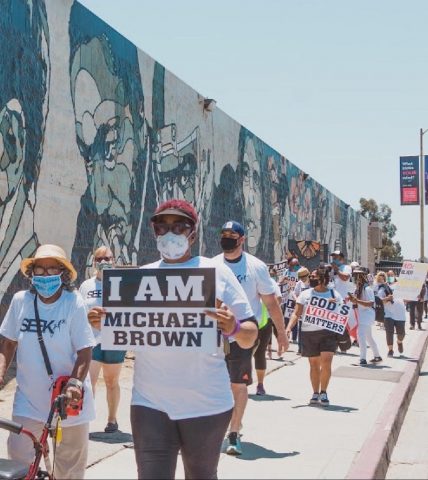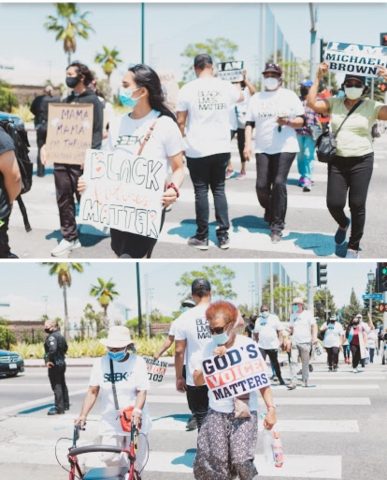
Unity. Justice. Community. Peace.
That’s what the demonstration on June 3 in Los Angeles was all about—around 300 people gathered to pray, march, and connect. It was the first time one of our Southern California Conference (SCC) churches organized an event like this. It was a diverse group in every sense of the word: age, gender, ethnicity, and more. One member of the group, Wilma, a member of the Antelope Valley church, had even marched with Martin Luther King Jr. when she was 17. “The conviction of people to be as involved as possible really ran deep throughout the whole crowd,” shared Donavan Childs, associate pastor at University church.

Morris Barnes, senior pastor of the Antelope Valley church, and Lawrence Dorsey, senior pastor of the University church, teamed up to bring this idea to life. The midweek event came together in the span of just two days, although from Childs’s perspective, “it was literally overnight. When God’s moving, He makes it happen,” he said.
The natural history museum helped to get the word out around the city. USC provided lunch, CHP provided security, the local Honda dealer gave participants water and loaned vehicles for shuttles, LAPD Southwest Division marched with the group and helped block traffic, and much more. “The Lord was in this thing; that’s the only way it could come about the way it did with unity, enthusiasm, and support,” said Dorsey.
“The philosophy behind it was to have an Adventist Christian demonstration that promoted peace and justice,” Childs explained. The march began at the steps of the University church and ended at the California African American museum, where various Adventist leaders and other clergy, plus leaders from around the city and the community, addressed the people.
The moment he became aware of the event, SCC President Velino Salazar committed himself to participate. “As conference president, I think that we need to walk the talk,” he said. “What would Jesus do in this 21st century? Always He was focused on the needs of the people and justice. That’s why, as conference president, I need to follow the model of Jesus Christ when we encounter oppression, discrimination, and injustice.”
“
It is an ecumenical response to what’s wrong and to protest—not just against what’s wrong, but to protest for what’s right.
Virgil Childs, Pacific Union Conference regional ministries director
Participants wore custom shirts with “seek justice” printed on the front, based on Isaiah 1:17, and “Adventists for Black Lives Matter” on the back. The shirts represented another miracle; they were meant for a prayer walk two days later, but production was accelerated just in time for the Los Angeles demonstration. Many carried signs: “God’s voice matters.”
Reflecting on the event, many participants spoke about this as an important first step. “I consider that we as a church need to have more interest in social issues without losing the essence of the gospel within the context and frame of the three angels’ messages,” Salazar said.

“It was tremendous; it was something to experience,” Royal Harrison, SCC Greater Los Angeles region director, said of the event. “We’ve got to be more community involved if we’re going to make an impact for the kingdom.” The theme of community involvement was consistent among comments from the participants and leaders. As Barnes put it, “If the church is not the voice of the community, no one else will be.”
This event was just a start. At the rally, Donavan and Dorsey promised attendees that future open forums would be presented by the church, encouraging conversation with the community. “I think it’s important for us as Christians to understand that this is part of representing the gospel,” Donavan noted. “It’s part of having a missional existence. I hope the long-term impact is that we actualize that term: to be in the world but not of the world.”
Speaking about how our commitment to the truth relates to injustice, Greg Hoenes, SCC West Region director, said, “Humility has to always be the lens through which we see the truth.”
Virgil Childs, Pacific Union Conference regional ministries director, closed the event with prayer. Of our collective response to injustice, he said, “It is an ecumenical response to what’s wrong and to protest—not just against what’s wrong, but to protest for what’s right.”

